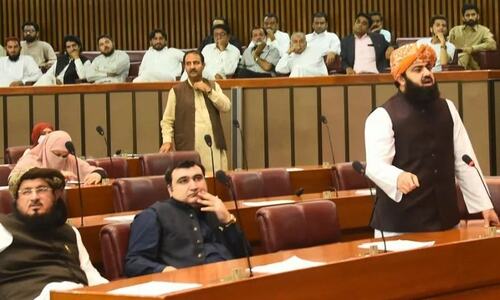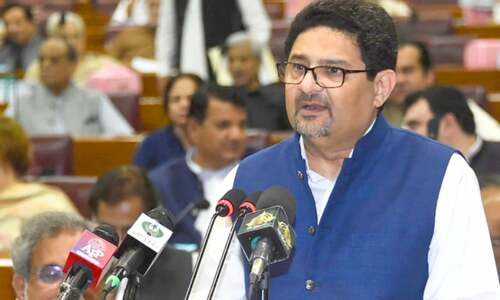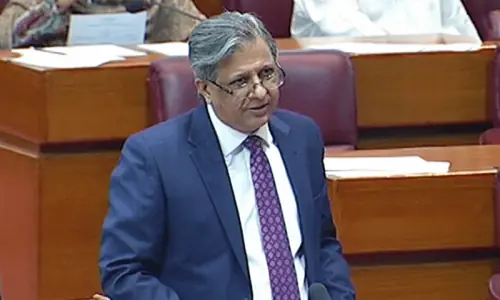The National Assembly (NA) on Wednesday approved the passage of the Finance Bill, 2022, commonly known as the federal budget, with a majority vote after taking it up clause by clause.
There was virtually no opposition to the passage of the bill — similar to last year.
The passage of the budget for the fiscal year 2022-2023 brings the government one step closer to the revival of the stalled International Monetary Fund (IMF) programme.
On June 10, Finance Minister Miftah Ismail had presented the budget with an outlay of Rs9.5 trillion, the government had avoided taking unpopular tax measures for fear of political backlash. However, the government slowly had to roll back several relief measures after the IMF asked Islamabad to take practical measures to stabilise the economy.
Minister of State for Finance and Revenue Dr Aisha Ghous Pasha presented the Finance Bill, 2022 during today's session which was chaired by NA Speaker Raja Pervez Ashraf.
The session, which commenced after more than a two-hour delay, began with Pasha asserting that the budget for the new fiscal year was not changed at the request of the International Monetary Fund (IMF).
She maintained that 80 per cent of the amendments were directly related to taxes. "Our aim is to tax the rich and to give relief to the poor," she said.
She went on to say that the coalition government was implementing the agreements the former PTI government had inked with the Fund.
After the state minister's remarks, the NA began the clause by clause approval of the finance bill.
During the process, the lower house of parliament approved the amendment to impose a Rs50 levy on petroleum products.
Commenting on this, Finance Minister Miftah Ismail said that currently no levy had been imposed on petroleum products.
“The government has received permission from the house to impose a petroleum levy of Rs50/litre on petroleum products. At the moment, there is no consideration and hope of immediately going up to this figure," he said.
The NA also approved amendments for collecting sales tax from traders through electricity bills and imposing a 5pc tax on the services of IT and software consultants.
An amendment to take back the relief provided to the salaried class was also approved. Under the new rates, no tax will be imposed on those earning less than Rs0.6m per year. Meanwhile, those earning between Rs0.6m to Rs1.2m will have to pay a fixed tax of 2.5pc of the amount exceeding Rs0.6m.
Those earning Rs1.2m to Rs2.4m will have to pay a fixed tax of Rs15,000 plus 12.5pc of the amount exceeding Rs1.2m. Where taxable income exceeds Rs2.4m but does not exceed Rs3.6m the tax rate is Rs136,000 plus 20pc of the amount exceeding Rs2.4m.
Those earning between Rs3.6m to Rs6m will have to pay Rs405,000 plus 25pc of the amount exceeding Rs3.6m. For income between Rs6m to 12m, the tax will be Rs1m plus 32.5pc of the amount exceeding Rs6m. Where taxable income exceeds Rs12m, the tax is Rs2.9m plus 35pc of the amount exceeding Rs12m.
Further, the NA approved an amendment for imposing a super tax between 1-4pc on the income of those earning between Rs150m to Rs300m. It also approved imposing a 10pc "super tax" on large-scale industries.
Under the bill, a levy between Rs100-Rs16,000 was imposed on the import of mobile phones depending on its value. For mobile phones having a cost-and-freight (C&F) up to $30, it will be Rs100. For phones more than $30 and less than $100, it will be Rs200.
In the same way, for phones costing up to $200, it will be Rs600. For phones up to $350, it will be Rs1,800. For phones costing up to $500, the rate of levy will be Rs4,000. Meanwhile, for phones worth up to $700 it will be Rs8,000, while for phones more than $701 it will be Rs16,000.
Duty on the import of equipment for the film industry, including projectors, loud speakers and 3D glasses, was also abolished.
MQM criticises govt
The start of the session saw lawmakers from the Muttahida Qaumi Movement-Pakistan (MQM-P) — which is part of the PML-N-led coalition government — lambasting their allies.
Without naming anyone, MQM-P MNA Engineer Sabir Hussain Kaimkhani said he was in the assembly after being elected by his constituency, not to plead for something.
"We get these ministries, these seats so as to earn respect and serve. If we don't even get respect after getting these seats, then we [reject this]," he said.
Kaimkhani, who was elected from Hyderabad's NA-226 constituency, said there was "one person present here because of whom we don't have the necessities in our city".
"Our airport is shut, our PIA (Pakistan International Airline) office is closed, there are accidents on our railway tracks every day and blasts occur on our railway tracks. But no one is here to answer for the railway and PIA's downgrade," he complained.
The MNA pointed out that the relevant minister was present in the assembly to address his complaints.
"I am walking out against their behaviour and I am leaving after saying this: With them [being a part of the government], neither the government nor the assembly can run," Kaimkhani said.
He was joined by MQM-P MNA Salahuddin, who said his party had paid a political price and was bearing its consequences today.
In a response to a rebuttal that was inaudible, Salahuddin threatened that "we will not take a minute before moving from here to there" — an apparent reference to shifting from treasury to opposition benches.
131 demands for grants approved
A day earlier, the government had completed the process of approving all 131 demands for grants of various ministries and divisions worth over Rs5.53 trillion.
The NA also rejected 266 cut motions submitted by opposition members, demanding a symbolic cut on allocations of eight ministries, including communications, energy, foreign affairs, interior, narcotics control and railways.
The lower house of the parliament had already approved on Monday 83 demands for grants worth Rs4.57 trillion of those 30 ministries and divisions on which the opposition parties had not moved any cut motions.
In parliamentary democracy all over the world, voting on demands for grants and cut motions is considered a crucial phase of the budget session as opposition members get an opportunity to give a tough time to the government by moving cut motions on ministries and divisions.
But the present coalition government did not face any difficulty at this crucial stage of the budget session as there is no meaningful opposition in the house after the en masse resignation of PTI members following the ouster of the Imran Khan government.
Budget at a glance
Finance Minister Miftah Ismail had unveiled the budget for the coming fiscal year on June 10. In this initial version of the budget, having an outlay of Rs9.5 trillion, the government had avoided taking unpopular tax measures for fear of political backlash.
The government has budgeted the total current expenditure at Rs8,694bn for FY23, which is 15.5pc higher than last year's budgeted figure.
Interest payments, or debt servicing, account for 45.4 per cent of the total current expenditure, having been increased by a whopping 29.1pc from last year to Rs3,950bn. Meanwhile, defence expenditure has been budgeted at Rs1,523bn, which makes up 17.5pc of total current expenditure and is 11.16 per cent higher than last year.
In the initial version of the budget, the total revenue stood at Rs9,004bn. After subtracting provincial transfer of Rs4,100bn as part of the National Finance Commission (NFC) Award, net revenue came out at Rs4,904bn.
However, after the government announced new revenue measures and new taxes last week, the
net revenue measures announced in the 2022-23 budget now amount to Rs905bn.
Moreover, the government had initially set the tax collection target for the Federal Board of Revenue (FBR) at Rs7,004bn for FY23. Under last week's measures, it increased the FBR's tax collection target to Rs7.47tr. The target for non-tax revenues, on the other hand, has been revised down to Rs1.94tr from Rs2tr.
Total allocations for the Public Sector Development Programme (PDSP) have been budgeted at Rs2,158bn for FY23, up just one per cent from Rs2,135bn last year. The government has set a growth target of five per cent.
New tax measures
Last week, Prime Minister Shehbaz Sharif had also announced a 10 per cent “super tax” on 13 large industries to raise an additional Rs465 billion in revenue, in an attempt to trim the budget deficit.
The 13 industries to be taxed include cement, steel, sugar, oil and gas, fertilisers, LNG terminals, textile, banking, automobile, cigarettes, beverages, chemicals and airlines. High net worth individuals and companies will also be subject to a “poverty alleviation tax”.
Those whose annual income exceeds Rs150 million will be taxed at 1pc; for Rs200m at 2pc; Rs250m at 3pc; and Rs300m at 4pc of their income.
Finance Minister Miftah Ismail also announced these measures during his address to the NA the same day in a session convened to wind up the budget debate and elaborated that both these taxes were a "one-time tax" for the fiscal year 2022-23.
He further told the NA that a new fixed tax scheme on shops outside of the tax net to reduce the budget deficit.
There were around nine million retail shops in Pakistan and the government wanted to bring 2.5m to 3m of them into the tax net, he said, adding that for this, a new fixed scheme had been introduced under which a small shop owner will pay a fixed tax of Rs3,000 and big retailers Rs10,000 per month.
“After that, they will not be questioned on anything else,” the minister added.
The retailers dealing in gold and had shops of 300 square feet or less would have to pay a fixed income and sales tax of Rs40,000, which was reduced from Rs50,000. For bigger shops, the sales tax had been reduced from 17pc to 3pc, he added.
The withholding tax on gold sold by individuals to goldsmiths has been reduced from 4pc to 1pc. A similar scheme of fixed tax will be announced for realtors, builders and car dealers.
Moreover, the government also intends to apply a maximum petroleum levy of Rs50 per litre on all petroleum products, including petrol and diesel, besides a levy of Rs30,000 per tonne on liquefied petroleum gas.
At the same time, the Rs47bn tax relief announced by the government in the next year’s budget for salaried citizens was also reversed. The tax exemption limit has been reversed to Rs600,000 from Rs1.2 million, whereas the fixed tax of Rs100 has been replaced with a 2.5pc tax for individuals earning between Rs600,000 and Rs1.2m.
Likewise, those earning Rs1.2m to Rs2.4m will pay a 12.5pc tax instead of 7.5pc last year, and individuals earning Rs2.4m to Rs3.6m a year will be charged at Rs165,000 plus 20pc of the amount exceeding Rs2.4m.
Those earning Rs3.6m to Rs6m a year will be charged at Rs405,000 plus 25pc of the amount exceeding Rs3.6m.
People with an annual income of Rs6m to Rs12m will be charged at Rs1.005m plus 32.5pc of the amount exceeding Rs6m.
In the last slab, individuals earning more than Rs12m a year will be charged at Rs2.955m plus 35pc of the amount exceeding Rs12m.
More to follow
































